A Canadian Vision of Planet China: Part II
Harold and Lynn in August 2013 waiting to board the Bullet Train for Shijiazhuang, China. Join us for the continuation of our adventure with nephew Lorin Yochim. This photo is sample of our travel gear minus the two small Tilly suitcases whose little wheels have logged tens of thousands of miles.
April 12, 2014, This post is currently under construction. Photos to be added by Sunday, April 13.
Link Here to Part 1 of the China Story
Link Here to Full Photo Story leading to and in Shijiazhuang, China
Introduction to Part II
The whirlwind we left behind in Beijing and the surrounding country left of breathless. We met so many people who hosted us in the most welcoming ways. Granted, the circles in which Lorne and his family travelled likely placed them in the “well to do” strata of Chinese Society, I would say it was still “middle class” as we might find in many other parts of the world including Canada. Poverty was clearly evident and, based on stories told by Lorin,
I think there is a much larger segment of Chinese society who suffer from what we consider the “essentials” of life, far more than we would see in many of the dozens of countries we have visited across Europe, Australia, New Zealand, and Japan as but a few examples. The other think that was evident, is a feeling the country is tightly controlled politically and economically. If you are on the “inside” things are pretty good, but if on the outside, I really don’t know as I never had a chance to taste that part of Chinese life, as, by all accounts we are “rich Canadians”. Now back to touring.
As a partnership between a senior ‘wannabe’ and one who is well established, Lynn and I are pretty adept at handling ‘free-style’ travelling as we have travelled a good part of the world with one small suitcase and backpack each. We seldom made reservations more than a day at a time and left our means of travel (other than destination airlines) pretty much up to chance. While we never hitchhiked, we usually found an economical means of travel within and between connected countries. China, however, presented a few challenges, not the least of which was the language barrier. English is definitely not a second language in China as they likely have twenty languages of their own to keep us off balance.
While foreign tourism in China is growing at an exponential rate, most tourism is still domestic; therefore, the need for local English and other language service remains very low. Even at the main airports and train stations, it can be difficult to find an English-speaking attendant so, for a visit shorter than five years, learning the language is not an option. Such was not the case for Lorin as he was able to handle the language barrier in a manner that kept the Chinese off balance. There’s no better way to surprise people who think you don’t know what they are saying and then enter the conversation in their language as if you were a next door neighbour. Lorin, that loveable chap, could stop all conversation in a small restaurant filled with Chinese only patrons when he began to question the waiter or some other person in their language.
Because we had such close contact with Lorin, his family and friends, our trip was turned from one in which we would have been stuck in the usual ‘tourist’ pack to one filled with continuous adventure in the most out of the way place. Join us for Part II as we head out from Beijing on a train that will soon touch a third the speed of sound and take us through a countryside filled with the old and new. In our travels to date, China provides the best example of a country where modernity is extinguishing the past at the breakneck speed of a Bullet Train.
8. Levitating across China
The day begins by catching a train at the main station in Beijing, not just any train but, a state of the art Bullet Train. It seems China has the largest network of HSR (High Speed Rail) in the world with over 10,000 km of line (note, these are not tracks or rails in the traditional form).
Photo (Web): High Speed Trains sitting in the yard at the Beijing. These sleek, modern day giants will soon cover China like a swarm of prairie garter snakes. It is already a system of travel and commerce that is unmatched anywhere in the world.
This includes the longest single line – 2300 kilometers – connecting Beijing to Guangzhou. Expanding at a breakneck pace, by 2015, the lines will cover 18,000 kilometers and is already the most heavily used rail transport system in the world. It makes the Canadian diesel-electric system seem positively primordial and when people look at photos of our steam powered Royal Hudson huffing and puffing its way out of Vancouver, they immediately think of the Wild-West.
As we quickly gain cruising altitude (about a half-centimeter) we are soon traveling south, southwest at a laid back speed of 300 km/h. All is quiet and soft as a whisper, words that generally do not describe any facet of life in China.
As these trains can travel at well over 400 km/h, it will not be long before the Chinese take a run at the land-speed records set on the Bonneville Salt Flats of Utah. It is just another way the Chinese work to make points with the United States. Like their buddies across the Sea of Japan, the Chinese know how to run trains and if Lynn and I didn’t know the difference, we might actually think we were levitating.
Our economy-class seating was impeccable and would challenge first class service in any other part of the world. Our hostesses, who looked as if they had just jumped ship from an Air Emirates flight (photo left, from Web, more in attached album), were friendly, but totally averse to having their photo taken. Our wish (except for photos) was their c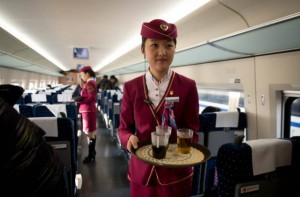 ommand. We cannot imagine what it must be like to travel first class in China as only the richest members of the CPC (Communist Party of China) and well-healed business community can afford the luxury.
ommand. We cannot imagine what it must be like to travel first class in China as only the richest members of the CPC (Communist Party of China) and well-healed business community can afford the luxury.
Never the less, we travel in our own form of luxury with a wireless connection at our fingertips, personal service catering, and washrooms – well let me tell you about the washrooms.
They were of a size and with fixtures that would challenge anything to be found in a five star hotel in Canada (although no bath facilities as yet – perhaps in first class). They are sized to host a small party if that is your interest. While many public facilities in China provide for an eye stinging, doorless, public poop, such is not the case on these trains. As you sit back on the heated seat (a cold weather idea imported from Japan) you can gaze out at the world, take a photo, read a book or work on your iPad or laptop until your legs fall asleep. (Link Here to Washroom Photos). Now, let’s talk a bit about the internet.
Back in our custom seating we stay connected to the world – well, almost connected. It seems the Chinese government, ‘acting on the wishes of the people’, have blocked access to social media sites such as Facebook, Twitter, Word Press and other similar systems. Apparently this was done to protect impressionable, young Chinese from the excesses that infect much of the outside world. However, in this tech savvy country ‘The Great Firewall’ as with the other Great Wall, is not as impermeable as the government might wish. With a few keystrokes we are able to change our settings to join another network and are soon back surfing our favourite sites and uploading photos to our hearts content.
Lorin suggests another reason for the firewall – many Chinese think creating the barrier will inspire development of homegrown systems that better serve the diverse interests of the Chinese people. Don’t laugh, we have accomplished similar goals in Canada with our Canadian media content rules and, in another area of censorship, one of our Provinces has gone further by legislating that only one language can be written or spoken in public. I have FB friends in that Province and often need to use the translating service too understand what they saying…so much for freedom of speech.
9. The Flatlands
As we fly through the countryside at nearly a third the speed of sound, the giant wraparound, tinted windows present a surreal flowing panorama of verdant fields filled with vegetables, grain crops and water filled rice paddies that stretch as far as the eye can see. On this crystal clear day, that is almost forever. By upping the shutter speed and sitting in the washroom (I am an inveterate multi-tasker), I was able too capture several shots of this amazing flatland.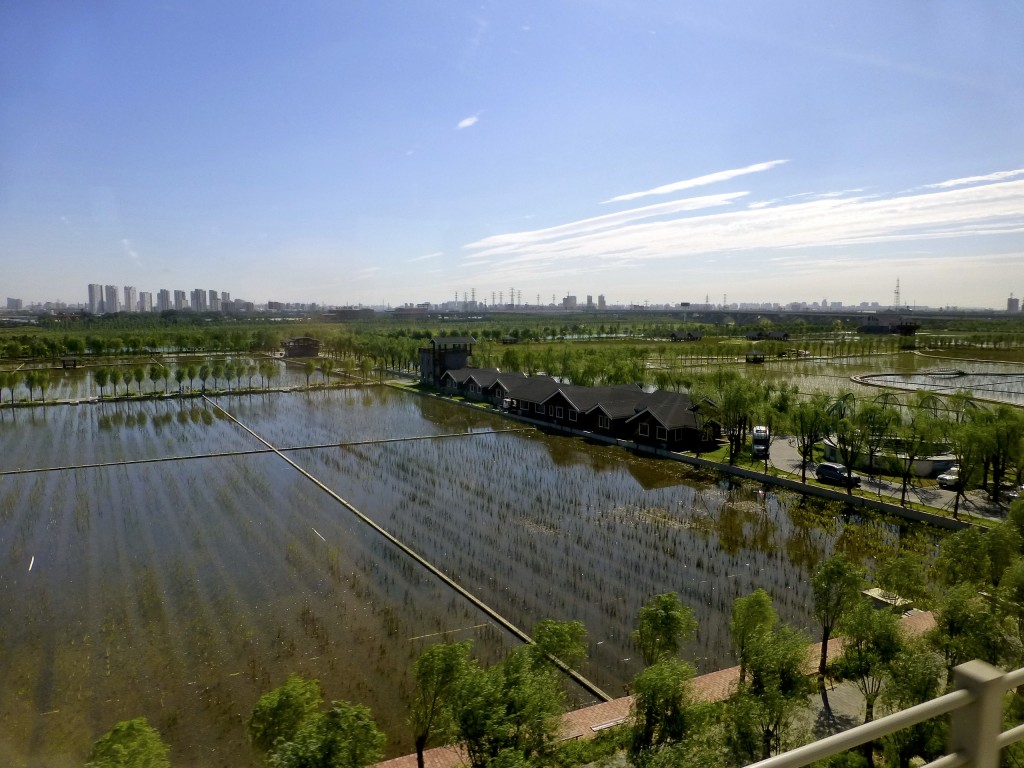
Photo: With a rice paddy in the foreground, a city takes shape along the distant horizon. For more photos of the ‘flatland’ Link Here.
Only an occasional village or construction site breaks the line of fields along our track, and on the distant skyline dozens of crane-topped skyscrapers in new and yet to be populated cities, take shape. In addition to the cushion of air on which we float, a network of freeways is being built to connect the farms, villages and cities in a yet to be defined system of commerce that will soon serve the people of China and the world.
We sense the Chinese truly believe that as more and more foreigners taste the bounty that is China, the country will soon be faced with immigration lines that stretch towards infinity. All this is emerging at lightening speed from a silent, secretive part of the world that existed well into the last century, at a time when foreign leaders such as Margaret Thatcher, Richard Nixon and others began to take notice. If any of those leaders anticipated China buying up other countries as they have today (it’s call Soft Power), they might well have skipped those visits.
Perhaps a few have read the 1931 best seller, “The Good Earth” by Pearl S. Buck. The book provided many outsiders with their first glimpse of that hidden world. The story traces the fortunes of Wang Lung and his family as they worked from dawn until dusk eking out a living in a harsh and unforgiving land. The family goal was to one-day reach the bounty the cities were believed to offer.
We cannot help but wonder what Wang Lung might have thought about a bullet train whizzing past his farm at 300 km/h while the city he so desperately hoped to reach, materialized on his very doorstep. His farm, suddenly worth millions, would be up for grabs as developers tried to outbid each other. Rather than moving to the city, Wang Lung and his family could retire to a South Pacific Island of their choosing. Since 2006, however, China’s trade, aid, diplomatic, and commercial activity in the Pacific region has been steadily and significantly scaling up. Excluding Papua New Guinea, two-way trade with China has overtaken that of Australia since 2013.4 For the Solomon Islands, two-way trade with China now makes up 46% of all trade.
Many of the families we visited have South Sea retreats in which the spend a good part of their lives with their children. Children you say? Yes, I thought China had a “one-child” policy. Perhaps it does but that need not apply to those who have the funds to do otherwise. Such is the fortune of many in China today. While many continue to toil away their lives much as did Wang Lung, others sop up riches at a speed close to that of the train on which we travel.
In this modern-day China, long standing family farms and well-established communities have fallen prey to developers. Within weeks a new high-rise, freeway or rail line can come crashing through gobbling up everything and everyone that stands in its way. Land speculation, unrestrained development and rampant consumerism lavishes riches upon a select few in an attempt to build a stronger middle class. This is no better demonstrated than in Shijiazhuang where a Will Rogers type of economy prevails: ‘all money (is) being appropriated (to) the top with a certainty it (will) eventually trickle down to the needy.’ One can only hope.
10. Welcome to Shijiazhuang: A Chinese Version of the Lego Movie.
As we levitated into Shijiazhuang, we were welcomed into giant, sparkling new rail station where we again entered the the Twilight 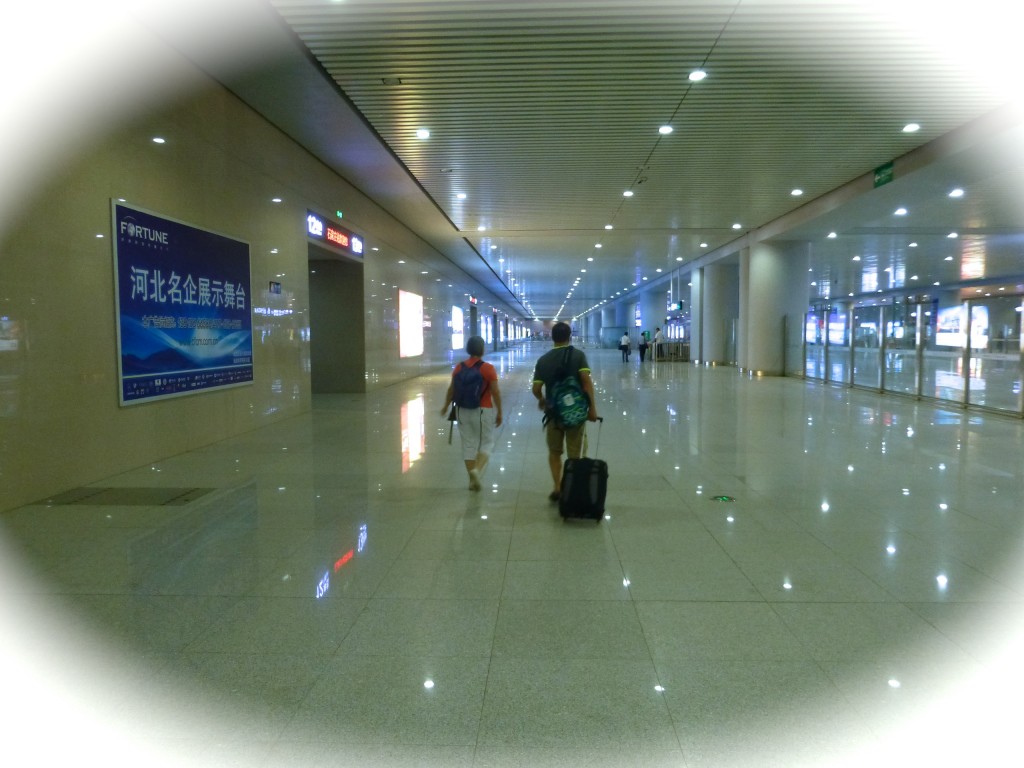 Zone.
Zone.
Photo: Lynn and Lorin lead the way along the concourse in one of the major cities in a country of 1.5 billion people. Eerie, is it not? For more photos Link Here
In this sprawling complex, it was as if everyone else had suddenly been beamed up to the SS Enterprise.
Remember, this the main entrance to a city of four million (somewhat larger than Metro Vancouver), yet we are completely alone as we walk towards the main exit. Perhaps our awesome nephew has simply forgotten to inform the local authorities and citizens of Shijiazhuang that the Canadian Delegation was paying a visit. FIFA would never make that mistake.
As we walked we walked outside, we were likewise presented with a nearly empty square surrounded by dozens of smaller buildings under construction. We suppose these structures were being erected for vendors who would soon flock to the area just as they have done in other cities. In another area of advance planning there were perhaps a fifty taxi cabs waiting in line, all impeccably outfitted, all licenced by the state and all perfectly empty except for the drivers.
When we inquired of Lorin as to the lack of people to fill these cabs, he assured us the Chinese philosophy as first enunciated by Chairman Mao and later plagiarized by Kevin Costner in his movie Field of Dreams, describes the situation today: “Build it and they will come.” Again, we shall see.
As most honoured guests, Lynn and I were ushered into the back seat while Lorin grabbed the front. Soon after, Lorin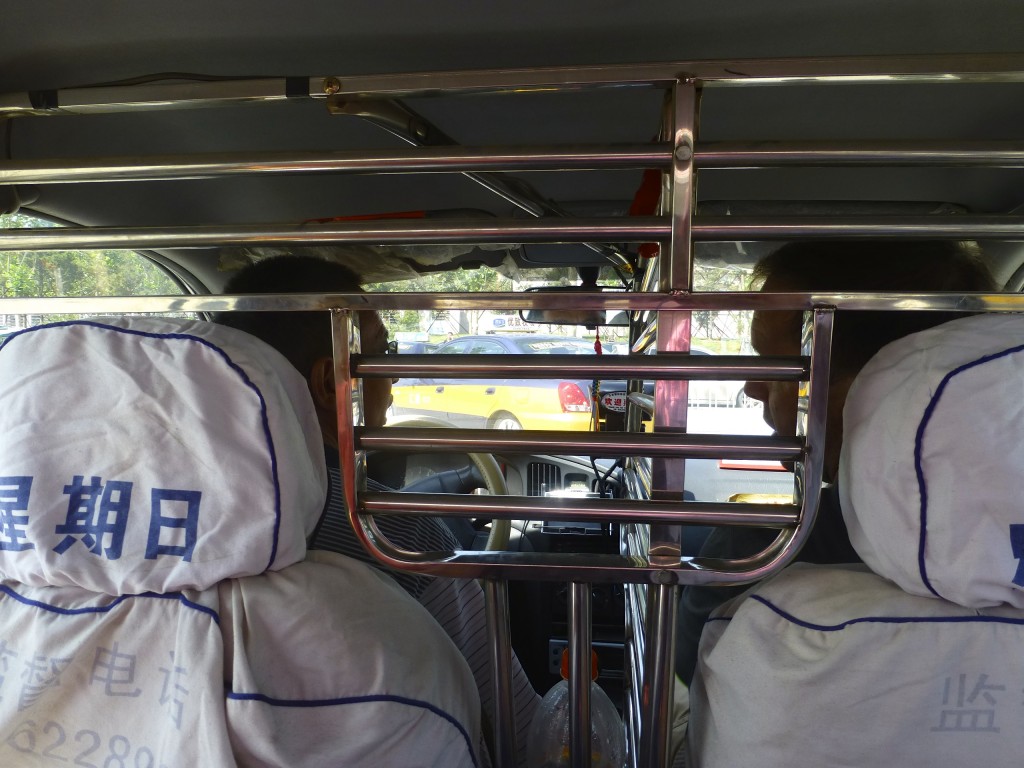 was immersed deep in a conversation with the cabbie who seemed happy to spend most of his time staring at his American, Mandarin-speaking passenger than at the road.
was immersed deep in a conversation with the cabbie who seemed happy to spend most of his time staring at his American, Mandarin-speaking passenger than at the road.
Although our seat belts did not work (a slight glitch in the system), Lynn and I felt perfectly safe as we are tucked behind a stainless steal cage that separated us from the front seat. We were absolutely certain the cage would prevent our being ejected through the windshield should the taxi come to grinding halt after a head-on collision. The only thing that might save us was the sanitized covers on the front seat.
Photo: Lorin chatting with the cab driver as we narrowly missed the yellow car directly in front of the cab.
Regardless of this, we found the Chinese safety features for transport (e.g. bicycle helmets, seat belts, airbags, not driving while using a cell phone, etc.) to be of the highest standard. All those supposed safety devices covered by laws in Canada, were non-existent in China.
As we circle Ring Road #2, we are presented with a construction wonderland, the likes of which we have never before experienced. It was as if we have been plunged into ground zero of the Lego Movie. Everyone in the city of four million (the city is planning is for eight) must somehow be involved in the construction industry. Not just thousands, but tens of thousands of cranes dot the skyline of every emergent city across China that have chanced to observe. Beijing a little less so as it is so old and so large, we never came close to touching offerings in that city of 23,000,000 (well over half the population of Canada today).
While traffic is heavy, it’s still no worse than Vancouver on a good day, but, as usual, drivers are routinely honk their horns to keep others moving along in an orderly fashion. As we make our way around the city, the pristine weather continues to enhance our experience. It seems the high-pressure area that covered Beijing for several days has now moved over to Shijiazhuang. We were tempted to ask Lorin about the lack of apparent pollution, but thought that would be cheeky at best and mean-spirited at worst. Perhaps we have just caught a few wonderfully clear days. This shows how our perceptions can be skewed by having been dropped into a moment in time when things are different (View post and link in Vocations of the Heart).
Photo: Shijiazhuang a lego city. For more photos Link Here
After settling in at his large, airy, well appointed, summer retreat (an eighth floor walkup) we then head out to meet his workmates. On our way down the stairs we understand why Lorin, Jin and Laur have become such fitness buffs. Out back we notice a number of family gardens covering two or three acres of land, but Lorin tells us he has not yet had a chance to plant a garden. It seems likely that if his Grandmother or Mother had spent more time with him in China, he would have soon been propelled towards his plot.
At his workplace, we meet a number of his fellow workers (actually they are mostly young woman as noted in the photo) and find it to be a most congenial place. As Lorin continues doing whatever it is that Lorin does, we mosey around taking pictures and becoming acquainted with others.
As noon approaches, we head out for lunch with a contingent of workmates something we have long since learned involves a very generous portion of sumptuous food and a variety of strange liquors that tickle the palette. Even Lynn, who seldom partakes, reaches that giggly stage. Lorin, it seems, has learned to pace himself.
11. Enjoying Shijiazhuang
The next day Lorin arranged for us to be hosted on a tour of Lychee Park and central Shijiazhuang. We quickly learned that Harry, one of his long-time buddies and about the same age as me, is a very entertaining guy. He not only speaks half a dozen languages, he knows more about other countries and people around world than anyone I have ever met. I suppose this comes from his having spent several decades jaunting around the world providing translating services for Chinese companies doing business abroad.
A 15-year-old, whose parents had hired Harry to teach the boy English, also accompanied us. As we wandered about we watched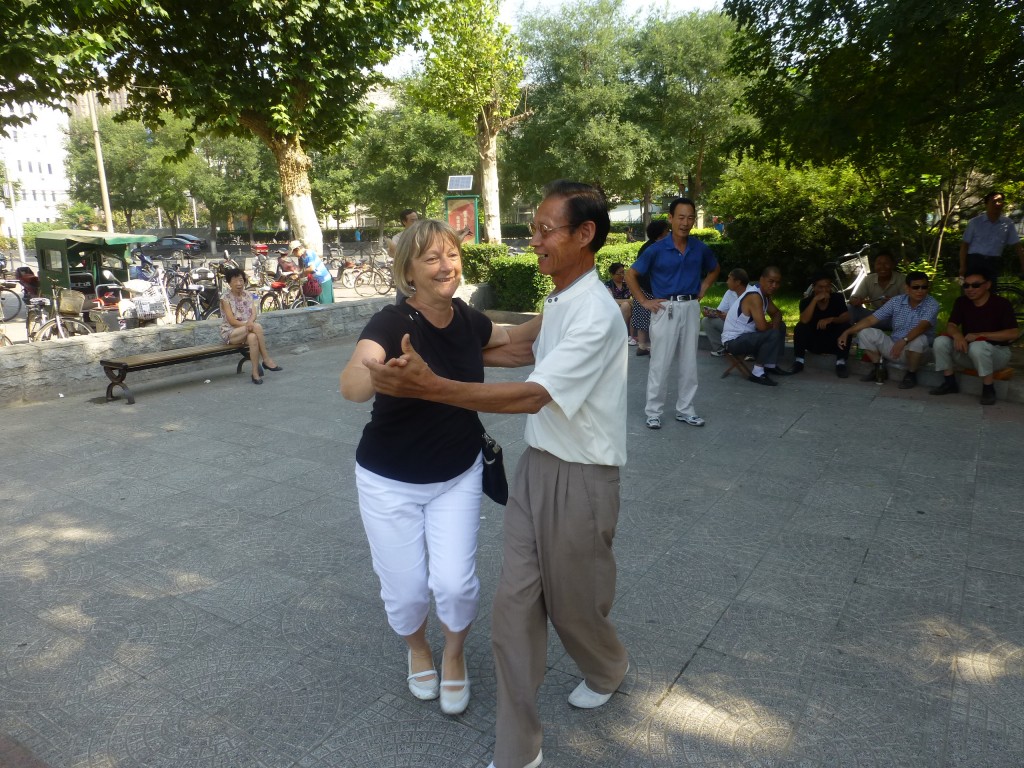 as dozens of pre-school children played with their mothers, fathers or caregivers. In the playgrounds there were also many older people doing workouts on the apparatus, something seldom seen in Canada. Then we came upon dozens of apparently retired people gathered for a regular morning Dancercise class. The music rotated between jive, tango, waltz and various other dance types. Everyone was clearly having a grand time and it was not long before Lynn and I joined in.
as dozens of pre-school children played with their mothers, fathers or caregivers. In the playgrounds there were also many older people doing workouts on the apparatus, something seldom seen in Canada. Then we came upon dozens of apparently retired people gathered for a regular morning Dancercise class. The music rotated between jive, tango, waltz and various other dance types. Everyone was clearly having a grand time and it was not long before Lynn and I joined in.
Photo: There was no end of men seeking to dance with Lynn. More photos Link Here
Perhaps it is a cultural misapprehension on our part, but these retired workers seemed to be very young and fit. Perhaps part of that could come from climbing the stairs to a tenth floor apartment half dozen times a day.
Although we did not recognize the songs, music is music no matter where you venture in the world and the dance types were ones that Lynn and I easily recognized. It was not long before we were being asked by others. It was a huge amount of fun and a real learning experience as these seniors were extremely good dancers.
Some time later, Lorin linked to a story about how Chinese officials trying to break up these dance routines as, apparently, the dancers are simply taking over many parks for their own use and other groups are being forced out. It seems this dancing in public — a form of exercise, hosts roughly 100 million adherents in China, most of them middle-aged and retired women. Hmm….(link here)
Later in the day we joined a Tai Chi class another popular form of exercise and relaxation. As we wandered we found many others involved in other art forms, music and meditation and, more often than not, we were asked to become involved or to have our photo taken with a group. When wandering around China, I expect that not being part of a large group has its advantages. The residents are perhaps more inclined to seek out contact, for instance the man who man gave me some pointers on playing a two 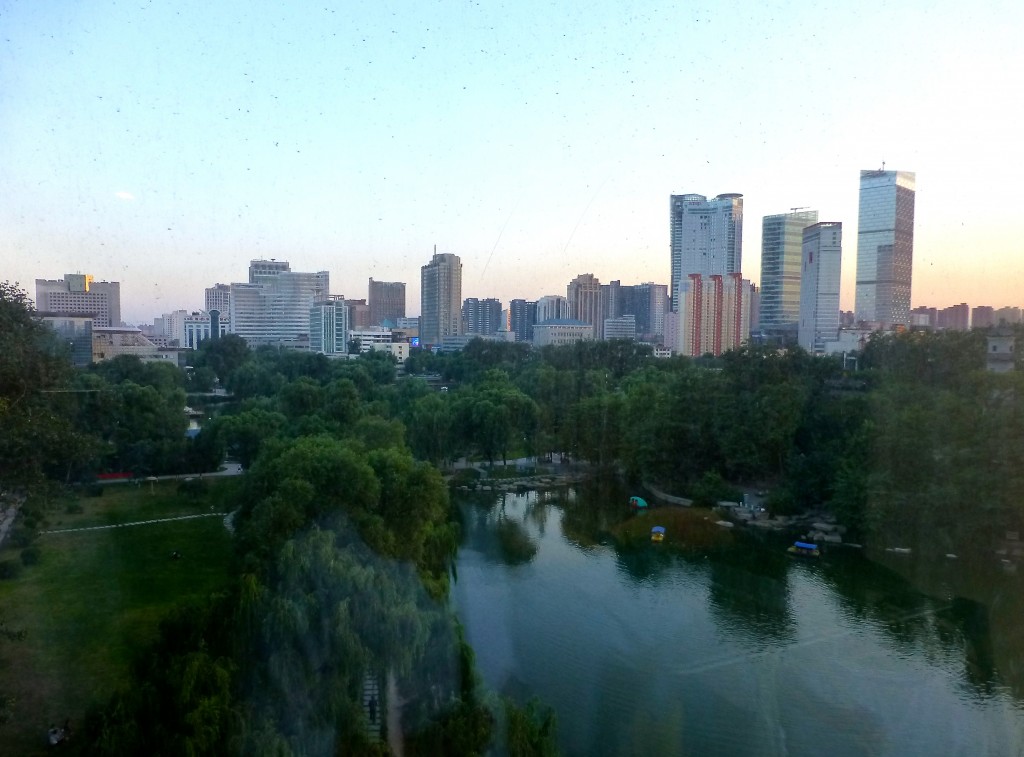 stringed instrument called an Erhu (Chinese Violin).
stringed instrument called an Erhu (Chinese Violin).
That evening, after rejoining Lorin, we were off to another dinner party with another of the friends of he and Jin. The delightful young couple, along with their two children, her mother and a live-in housekeeper, reside in large, well appointed, tenth floor apartment overlooking Lychee Park in downtown Shijiazhuang (photo left).
While their building is not all that old (perhaps ten years), it certainly shows the signs of aging around the exterior. This markedly contrasts with the upscale nature of their apartment itself. As only one of the two elevators worked we had to wait several minutes while the girls ahead of us took their motorcycles up to their apartment and then sent the rather slow machine back down.
Our waiting time was spent watching large screen television built into the wall across from the elevator, an unusual amenity placed in a rather non-descript building. We could have taken the stairs but after six hours dancing, Tai Chi and walking, we thought the elevator to be a good option.
In a later conversation over dinner, we learned the broken elevator would never be fixed. Why? Even though the residents own their apartment, no one pays any fee for the upkeep of the common area. Clearly, with time, these buildings will just deteriorate. So, what would happen if the other elevator broke? Nothing much, the families who could afford it, would just find a newer building, buy and renovate another apartment, then move in. Someone else, with on a smaller budget, would pick up this apartment at a fraction the cost and as long as they were willing to walk up and down ten flights of stairs, would live very comfortably. The Chinese, as we understand, are more concerned with what is inside than what is out. In Part III of this series, more will be said on this apparent lack of common interest in a country that is supposedly being built on common interest.
Over the next few days we continue to visit other parks and facilities around Shijiazhuang including a park dedicated to Dr. Henry Norman Bethune (1890-1939), a Canadian who became rather famous in China as a frontline surgeon in the in the second Sino-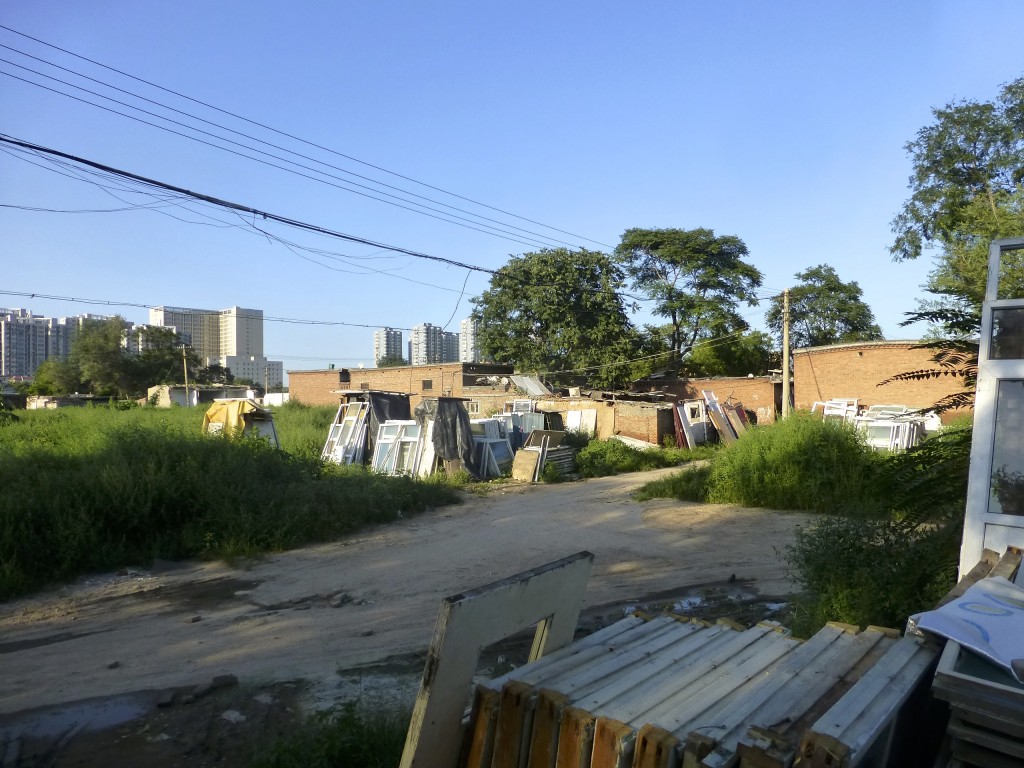 Japanese War. In each case we were treated to a snapshot of Chinese life both at present and over the distant past.
Japanese War. In each case we were treated to a snapshot of Chinese life both at present and over the distant past.
The parks as well as other local and foreign tourists stops were every bit as clean and welcoming as those you might find in Victoria or Vancouver. While some of the eating establishments displayed a certain lack of attention to detail, it would be not different than going to a small eatery in some of the backwater areas of BC, Alberta or Saskatchewan – great food and friendly, but…..
Photo: A small community was recently razed in preparation for a new high rise development. This was perhaps a 15 acre parcel of land right near the centre of the city.
In Shijiazhuang, Lorin was also able to give us a closer look at the communities being demolished to make way for new apartments and, as well, I have done a fair bit of research on the Internet. Neither Lorin, nor in any my reading, was I able find an explanation of what happened to the thousands (probably millions) of people displaced from these centuries long communities. In eons past, this farm community might well name Wang Lung as one of their home owners Unless the residents of this area were paid huge sums for their little patch of earth, they would clearly be excluded from moving into one of the new apartments. As far a Lorne could tell they just spread to another community further from the city in a random fashion that broke up decades of family and friendship connections. Perhaps that’s the best way to control a massive population. I was somewhat reminded of areas North of Toronto where hundreds tenement style apartments gobbled up farm-land over the past twenty years – – utilitarian at best.
In China, a whole way of life is being demolished in favour of new high-rise buildings and a city scape without sufficient parks, land to plant gardens, or areas in which people can socialize in more traditional ways (e.g. dance routines noted above). It seems these new buildings and common areas are destined to become ghettos in fifteen or twenty years if nothing is done to help replace fabric of the former cultural and societal connections.
While Canada has escaped some of this challenge as our land mass is so great, and population so small, we can see this very thing happening in many cities across the United States as their society stratifies and the poor become relegated to a ghetto existence. Then again think of the population disparity, United States, 330,000,000, and China with 1,400,000,000, with land masses almost the same at 9.6 million square kilometres.
While Canada is larger than both at 10 million square kilometres, we have a mere 40,000,000 people occupying that land. We could fit more than half the Canadian population into Beijing. Imagine, the entire populations of Toronto, Montreal, Vancouver, Calgary, Edmonton, Ottawa, Quebec City and a sprinkling of others, living in the same city? It might well lead to a Civil War if City Hall was placed in Ottawa and the others were just satellite Boroughs. Perhaps a Donald Trump type character might run for Prime Minister.
More will be said in China in the final part to this three part series, but first I wish to begin a series about our perceptions of life in the Middle East as I’m having a hard time keeping up with the stories about these foreign lands.
Harold
Link Here to Part 1 of the China Story
Link Here to Full Photo Story leading to and in Shijiazhuang, China
(3753)
Trackback from your site.

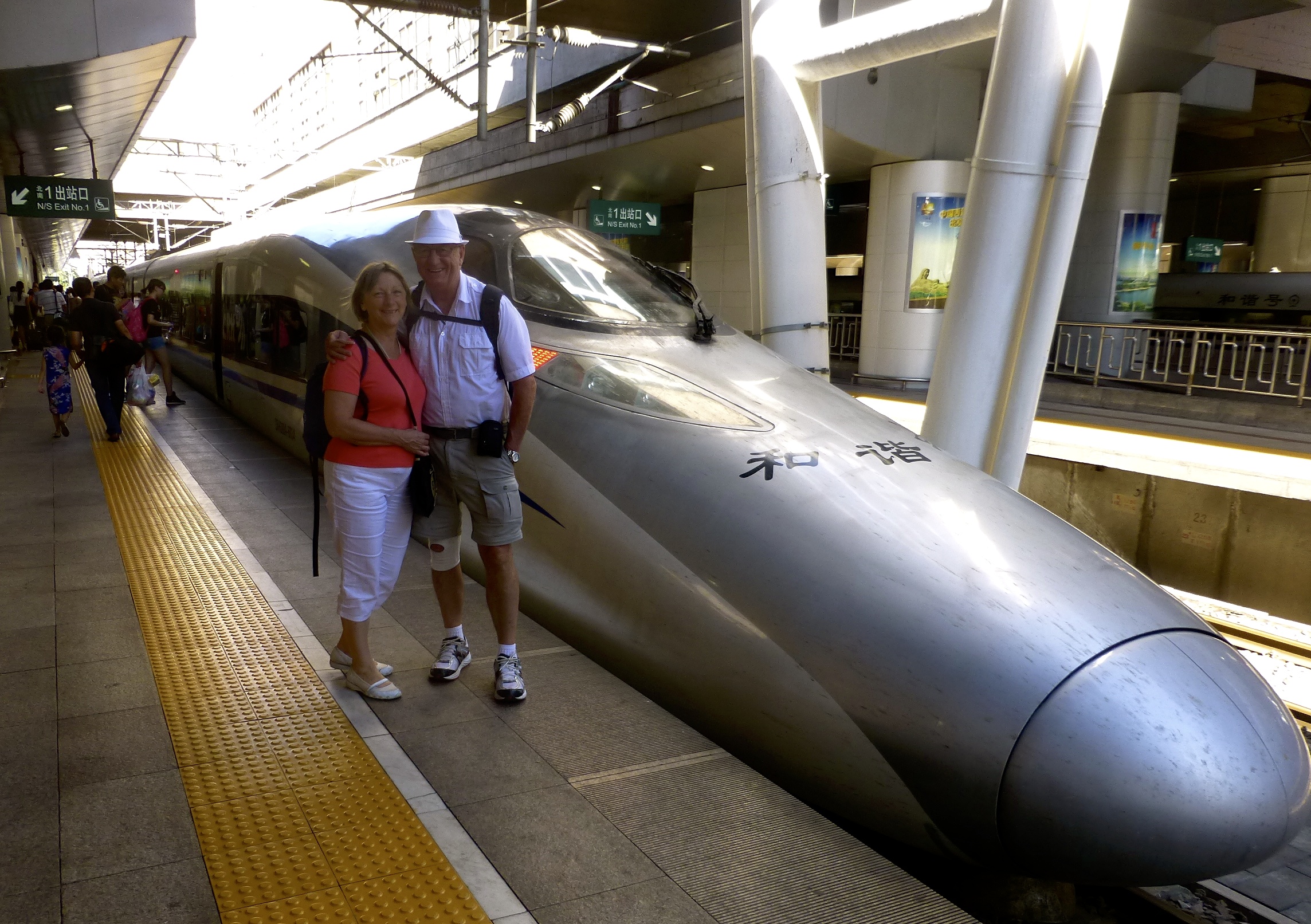
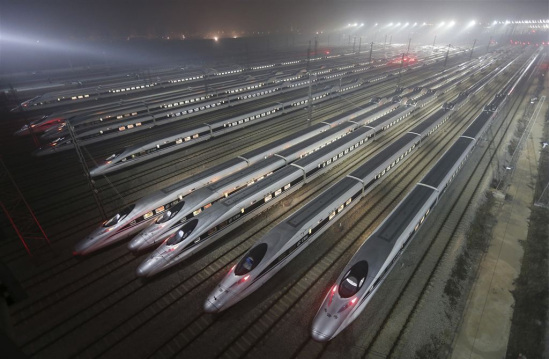
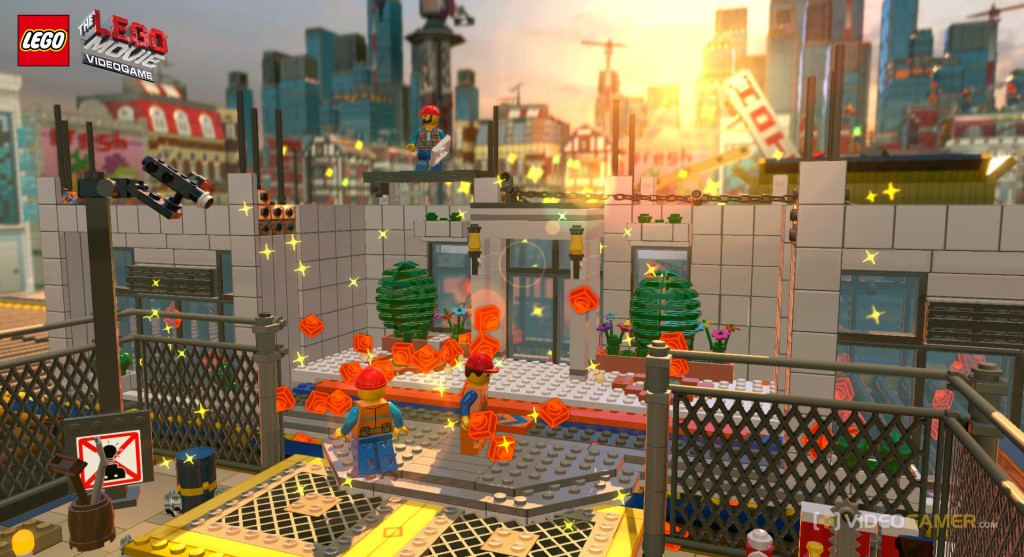
Comments (2)